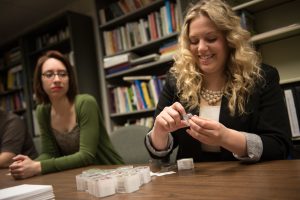
Social work students Joyce Idárraga, left, and Alissa Peanasky, right, look at the iPods they used for their research project examining the impact of personalized music on dementia caregivers.
UW-Eau Claire social work students are making a difference with never-done-before research on dementia caregivers — one personalized iPod at a time.
Through a grant issued by the Wisconsin Department of Health Services Division of Long Term Care, associate professor of social work Dr. Lisa Quinn-Lee, professor emeritus Dr. Donald Mowry and four undergraduate social work students, Joyce Idárraga, Allison Sontag, Ariel Yang and Alissa Peanasky, were able to research the impact on caregivers of the use of personalized music with individuals diagnosed with dementia, building on the work of the national nonprofit organization Music & Memory.
While previous studies have looked at the impact of the use of personalized music on dementia patients, the research by Quinn-Lee, Mowry and their students examined the impact of personalized music on patients’ caregivers, whether they are loved ones who are stressed and dealing with the emotional burdens of caring for the patients at home, or nursing home employees.
Alissa Peanasky, a social work major and music minor, was thrilled when Quinn-Lee approached her about becoming a student researcher.
“Dr. Quinn-Lee knew I had a passion for finding a way to use music in my profession,” Peanasky said. “She also knew that I have personal experience with dementia and that this project would be meaningful to me.”
According to previous research, playing music for clients can help with the behavioral issues often associated with dementia, as well as decrease the client’s anxiety and depression, often calming them and making them more happy, social and engaged with the world around them.
Little research has been done on the music’s impact on caregivers, which made participating in the research project all the more exciting, Peanasky said.
“It is exciting to do a research project that has never been done,” she said. “Doing research has been such an amazing learning experience. I had the opportunity to work with clients as a social worker. It was a safe and structured environment where I was able to practice my skills and learn from my mistakes. I was able to work with a demographic I hadn’t envisioned myself working with, and I realized how much I loved it.”
The three-month study conducted by Quinn-Lee and the students analyzed 22 home-based caregivers, while Mowry’s study looked at caregivers in long-term care facility settings.
First, the students conducted interviews with both the patients and their caregivers, as well as the patients’ friends and family members, about music preferences. From there, students created personalized playlists for each patient, providing each of them with an iPod, charger, over-the-ear headphones and gift cards for $50 worth of music. The equipment was purchased at low cost through Music & Memory, which also provided the students and faculty members training and certification in the use of personalized music with dementia patients.
The researchers met with the participants at least twice more to check in over the course of the study. Based on feedback, students would help teach clients how to use the iPods, and sometimes change the songs.
“They got experience really doing research from the beginning on,” Quinn-Lee said. “They were also involved with going out to all the participants’ homes for my study. They were the ones doing the interviews, gathering the information and data, and gathering the music out in the community.”
Being directly involved with clients and the overall research allowed Peanasky to see the impact of her research, and it gave her a look at what she can expect during her career as a social worker.
“I had one participant who was nonverbal, and had been for some time,” Peanasky said. “I placed the headphones on their ears with their personalized music playing. I then started writing down information for their caregiver. As I was doing this, the participant started dancing and singing along to their music. It was a life-changing moment and showed me how much of an impact this research could have.”
As they work toward publishing their findings and securing another grant to continue their work, Peanasky says one of the most unique aspects of the research is the support the students received throughout the process.
“We have amazing staff support from Dr. Quinn-Lee and Dr. Mowry,” she said. “They are involved in the process and are amazing educators. We could not be able to do this research without them.”
The students also partnered with outside agencies, including the Eau Claire Aging and Disability Resource Center, which provided a social worker to accompany the student researchers during their patient visits. This allowed the students to feel more comfortable, and gave them more credibility as researchers, Peanasky said.
The students were able to present their findings at UW-Eau Claire’s annual Celebration of Excellence in Research and Creative Activity, the National Conference on Undergraduate Research in North Carolina, the spring conference of the Wisconsin Council on Social Work Education, and the Provost’s Honors Symposium at UW-Eau Claire.
“The students were pretty in awe that they were doing this as undergrads,” Quinn-Lee said. “They realized the importance of research and impacting people’s lives as social workers.”
